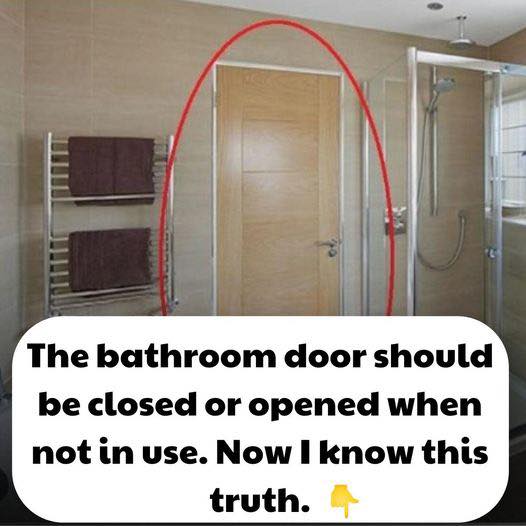Imagine stepping out of a hot, steamy shower feeling refreshed and clean, only to hesitate as you reach for the bathroom door. Should you leave it open to let the steam out, or should you close it and trap the moisture inside? While this may seem like a small, everyday decision, it actually plays a bigger role in your home’s cleanliness and air quality than you might think.

For the longest time, I always kept the bathroom door open after a shower. I figured it was the best way to air the room out, release all that built-up steam, and avoid that foggy-mirror, sauna-like feeling. I assumed I was helping the bathroom breathe, but as it turns out, I may have been doing more harm than good. Closing the bathroom door after a shower actually serves a more important purpose than most of us realize. Beyond personal preference, it’s about hygiene, moisture control, and maintaining healthier air throughout the house. Bathrooms are naturally humid spaces, and that humidity creates a cozy environment for bacteria, mold, and mildew to thrive.
By closing the door, you’re keeping that moisture—and all its unwelcome guests—contained within one area rather than allowing it to creep into adjacent rooms where it can settle and spread. Another common issue with leaving the bathroom door open is the spread of that damp, musty smell we all try to avoid. While you may have grown nose-blind to it, guests definitely notice. That unmistakable post-shower aroma has a way of sneaking into hallways, bedrooms, and living rooms if you don’t keep it in check. Closing the door ensures that the scent stays where it belongs and keeps the rest of your home feeling fresh. But keeping the bathroom door closed is only one piece of the puzzle. You also need to be mindful of what you’re keeping inside the bathroom. First up: towels.
While it’s convenient to hang your towel in the bathroom, the humidity can cause it to stay damp for hours, encouraging mildew growth and that funky smell that clings no matter how many times you wash it. Instead, hang your towel in a well-ventilated room or outside to dry completely. The same goes for wet clothes. It might seem logical to drape wet laundry over the tub or hang it from the shower rod, but that moisture just lingers in the air, feeding mold spores and increasing the overall dampness in the room. A laundry room or designated drying area with good airflow is a much better alternative. Another major no-no? Electric appliances.
While it may be tempting to leave your hairdryer, electric toothbrush, or razor plugged in for convenience, bathrooms are one of the worst places for these devices. High humidity and water splashes make the bathroom a risky environment for anything that uses electricity. To keep yourself safe—and your gadgets working—store them in drier, safer areas like a bedroom or hallway drawer. Even decorative items, like houseplants, may not fare well in the bathroom. Although some people love the spa-like vibe of greenery next to the bathtub, the constant humidity can lead to overwatering and root rot. Most plants prefer natural sunlight and controlled watering, which means they’re much better suited to a sunny windowsill in your living room. At the end of the day, closing the bathroom door after a shower isn’t just about keeping the fog off your mirror—it’s a simple yet effective way to control moisture, reduce bacteria spread, and prevent unpleasant odors from wandering through your home. And being mindful of what you leave inside your bathroom—from towels to electronics to plants—can make a big difference in how clean and comfortable your space feels. So the next time you step out of the shower, take an extra second to close the door behind you. Your home—and your nose—will thank you.





